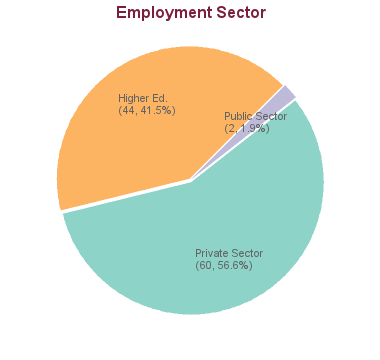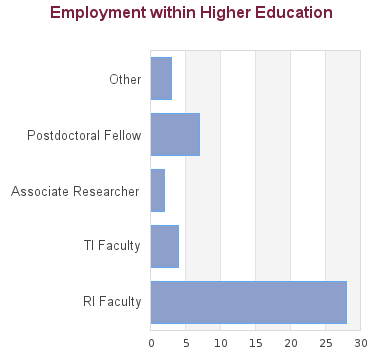
Barry Po
Job Title
Senior Director, Product & Business Development
Employer
NGRAIN

Review details about the recently announced changes to study and work permits that apply to master’s and doctoral degree students. Read more
PhD students in the Department of Computer Science may focus their research in the following areas:
The UBC Department of Computer Science has many contacts in the computing industry. A strong rapport between the industry and research communities is beneficial to both, especially in cases where the department focuses its research to developing real-world applications.
The Faculty of Graduate and Postdoctoral Studies establishes the minimum admission requirements common to all applicants, usually a minimum overall average in the B+ range (76% at UBC). The graduate program that you are applying to may have additional requirements. Please review the specific requirements for applicants with credentials from institutions in:
Each program may set higher academic minimum requirements. Please review the program website carefully to understand the program requirements. Meeting the minimum requirements does not guarantee admission as it is a competitive process.
Applicants from a university outside Canada in which English is not the primary language of instruction must provide results of an English language proficiency examination as part of their application. Tests must have been taken within the last 24 months at the time of submission of your application.
Minimum requirements for the two most common English language proficiency tests to apply to this program are listed below:
Overall score requirement: 100
Reading
22
Writing
21
Speaking
21
Listening
22
Overall score requirement: 7.0
Reading
6.5
Writing
6.5
Speaking
6.5
Listening
6.5
Some programs require additional test scores such as the Graduate Record Examination (GRE) or the Graduate Management Test (GMAT). The requirements for this program are:
The GRE is not required.
All applicants have to submit transcripts from all past post-secondary study. Document submission requirements depend on whether your institution of study is within Canada or outside of Canada.
A minimum of three references are required for application to graduate programs at UBC. References should be requested from individuals who are prepared to provide a report on your academic ability and qualifications.
Many programs require a statement of interest, sometimes called a "statement of intent", "description of research interests" or something similar.
Students in research-based programs usually require a faculty member to function as their thesis supervisor. Please follow the instructions provided by each program whether applicants should contact faculty members.
Permanent Residents of Canada must provide a clear photocopy of both sides of the Permanent Resident card.
All applicants must complete an online application form and pay the application fee to be considered for admission to UBC.
| Fees | Canadian Citizen / Permanent Resident / Refugee / Diplomat | International |
|---|---|---|
| Application Fee | $116.25 | $168.25 |
| Tuition * | ||
| Installments per year | 3 | 3 |
| Tuition per installment | $1,875.34 | $3,294.66 |
| Tuition per year (plus annual increase, usually 2%-5%) | $5,626.02 | $9,883.98 |
| Int. Tuition Award (ITA) per year (if eligible) | $3,200.00 (-) | |
| Other Fees and Costs | ||
| Student Fees (yearly) | $1,144.10 (approx.) | |
| Costs of living | Estimate your costs of living with our interactive tool in order to start developing a financial plan for your graduate studies. | |
Applicants to UBC have access to a variety of funding options, including merit-based (i.e. based on your academic performance) and need-based (i.e. based on your financial situation) opportunities.
All full-time PhD students will be provided with a funding package of at least $33,612 for each of the first four years of their PhD program. The funding package consists of any combination of internal or external awards, teaching-related work, research assistantships, and graduate academic assistantships. This support is contingent on full-time registration as a UBC Graduate student, satisfactory performance in assigned teaching and research assistantship duties, and good standing with satisfactory progress in your academic performance. CS students are expected to apply for fellowships or scholarship to which they are eligible.
All applicants are encouraged to review the awards listing to identify potential opportunities to fund their graduate education. The database lists merit-based scholarships and awards and allows for filtering by various criteria, such as domestic vs. international or degree level.
Many professors are able to provide Research Assistantships (GRA) from their research grants to support full-time graduate students studying under their supervision. The duties constitute part of the student's graduate degree requirements. A Graduate Research Assistantship is considered a form of fellowship for a period of graduate study and is therefore not covered by a collective agreement. Stipends vary widely, and are dependent on the field of study and the type of research grant from which the assistantship is being funded.
Graduate programs may have Teaching Assistantships available for registered full-time graduate students. Full teaching assistantships involve 12 hours work per week in preparation, lecturing, or laboratory instruction although many graduate programs offer partial TA appointments at less than 12 hours per week. Teaching assistantship rates are set by collective bargaining between the University and the Teaching Assistants' Union.
Academic Assistantships are employment opportunities to perform work that is relevant to the university or to an individual faculty member, but not to support the student’s graduate research and thesis. Wages are considered regular earnings and when paid monthly, include vacation pay.
Canadian and US applicants may qualify for governmental loans to finance their studies. Please review eligibility and types of loans.
All students may be able to access private sector or bank loans.
Many foreign governments provide support to their citizens in pursuing education abroad. International applicants should check the various governmental resources in their home country, such as the Department of Education, for available scholarships.
The possibility to pursue work to supplement income may depend on the demands the program has on students. It should be carefully weighed if work leads to prolonged program durations or whether work placements can be meaningfully embedded into a program.
International students enrolled as full-time students with a valid study permit can work on campus for unlimited hours and work off-campus for no more than 24 hours a week during academic sessions.
A good starting point to explore student jobs is the UBC Work Learn program or a Co-Op placement.
Students with taxable income in Canada may be able to claim federal or provincial tax credits.
Canadian residents with RRSP accounts may be able to use the Lifelong Learning Plan (LLP) which allows students to withdraw amounts from their registered retirement savings plan (RRSPs) to finance full-time training or education for themselves or their partner.
Please review Filing taxes in Canada on the student services website for more information.
Applicants have access to the cost estimator to develop a financial plan that takes into account various income sources and expenses.
111 students graduated between 2005 and 2013. Of these, career information was obtained for 106 alumni (based on research conducted between Feb-May 2016):


Our faculty and students actively interact with industry in numerous fields. Via internships, consulting and the launching of new companies, they contribute to the state-of-the-art in environmental monitoring, energy prediction, software, cloud computing, search engines, social networks, advertising, e-commerce, electronic trading, entertainment games, special effects in movies, robotics, bioinformatics, biomedical engineering, and more.
These statistics show data for the Doctor of Philosophy in Computer Science (PhD). Data are separated for each degree program combination. You may view data for other degree options in the respective program profile.
| 2023 | 2022 | 2021 | 2020 | 2019 | |
|---|---|---|---|---|---|
| Applications | 281 | 265 | 375 | 299 | 278 |
| Offers | 31 | 40 | 41 | 45 | 26 |
| New Registrations | 14 | 15 | 20 | 20 | 16 |
| Total Enrolment | 129 | 124 | 116 | 98 | 81 |
Students in research-based programs usually require a faculty member to function as their thesis supervisor. Please follow the instructions provided by each program whether applicants should contact faculty members.
These videos contain some general advice from faculty across UBC on finding and reaching out to a supervisor. They are not program specific.
| Year | Citation |
|---|---|
| 2016 | Dr. Lu studied social influence and its applications in viral marketing and recommender systems from a computational perspective. He proposed mathematical models to encode complex social interactions and designed algorithms to efficiently and effectively tackle influence maximization problems in such contexts. |
| 2016 | Dr. Izsak studied sheaves on graphs, which similar to maps, are tools that help track data. Her research resulted in several foundational theorems and answered a question about the difficulty of checking an important sheaf property. Her results are useful in the study of open problems in group theory, graph theory and computational complexity. |
| 2016 | Dr. Edwards developed numerical methods for the physical simulation of fluids. His work improves upon the accuracy and efficiency of previous methods. Applied to computer graphics, this work help to improve what is possible in special effects. |
| 2016 | Dr. Macedo developed novel mathematical tools and numerical algorithms for the solution of optimizing problems arising in scientific imaging. His work outlines a nonstandard theoretical approach to such problems as well as a concrete computational realization capable of solving large scale instances in practical scenarios. |
| 2016 | Dr. Brehmer studied why and how people use data visualization tools and techniques to process information. He introduced a framework for classifying visualization tasks and used it to conduct design and evaluation projects in the domains of journalism and energy management. His research can be applied when developing new data visualization tools. |
| 2016 | Dr. Agrawal developed new methods to generate realistic, animated, character motion efficiently. His work uses physics-based simulation, motion-capture and optimization in order to create motion for applications including games, film, and training simulations. |
| 2015 | Dr. Meyer performed a detailed analysis of the behavior of two large computer storage systems. He found that in many cases simple opportunities to increase performance and compress data have been passed over in favor of more complex and costly alternatives. The data in this work stands as the largest file system metadata study performed to date. |
| 2015 | Dr. Cai studied the 802.11 interference problem in WiFi networks, and showed a direct correlation between network congestion and wireless interference. He argued for trading some bandwidth for less interference and better fairness in 802.11 networks. He proposed a system to identify interference by correlating throughput changes of wireless devices. |
| 2015 | Dr. Mehranpour created a model to identify which proteins are better targets for drugs, and which part of each protein interacts with drugs and enzymes. This model can be used by biochemists and biologists to probe the behaviour of proteins in different diseases, with the goal of controlling the progress of diseases such as Cancer and Alzheimer's. |
| 2015 | Dr. Tayarani completed his doctoral studies in the field of Computer Science. His research focused on design principles for building large-scale software systems. He worked on simplifying applications which operate using numerous computers, and he built a framework which helps developers to deal with distributed system artifacts. |
Computer Science covers Bayesian statistics and applications, bioinformatics, computational intelligence (computational vision, automated reasoning, multi-agent systems, intelligent interfaces, and machine learning), computer communications, databases, distributed and parallel systems, empirical analysis of algorithms, computer graphics, human-computer interaction, hybrid systems, integrated systems design, networks, network security, networking and multimedia, numerical methods and geometry in computer graphics, operating systems, programming languages, robotics, scientific computation, software engineering, visualization, and theoretical aspects of computer science (computational complexity, computational geometry, analysis of complex graphs, and parallel processing).
Departments/Programs may update graduate degree program details through the Faculty & Staff portal. To update contact details for application inquiries, please use this form.

This city won’t disappoint. It has it all: sea, parks, mountains, beaches and all four seasons, including beautiful summers and mild, wet winters with snow.